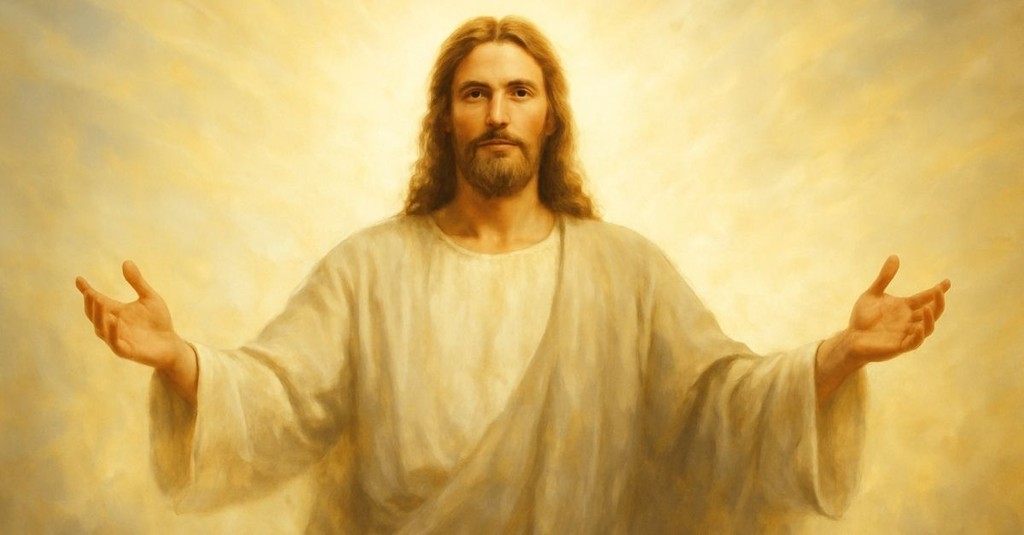
The divinity of Christ is an age-old discussion, addressed in the Gospels and debated in the early church. The Jews primarily found offense with Jesus’ self-identification as divine and equal with Father, to the point that they planned to kill him. This central claim about Jesus also met with debate and clarification in the first few centuries after Jesus’ death and resurrection.
While the Gospel of Jesus spread throughout the Roman world, believers faced questions. Was Jesus fully divine, fully human, or both? Was he created or eternal? Teachers like the bishop Arius claimed Jesus was created, while others defended the apostolic declaration of his being fully God.
Church leaders met to address this important element of Christian doctrine, one which threatened to divide them. They examined Scripture and focused on the apostolic teaching. The discussions escalated until the Council of Nicaea in 325 AD, where all the leading bishops disagreed with Arius and absolutely stated that Jesus is “of one substance with the Father.” This formed the basis of the Nicene Creed, the first formal declaration of universal Christian belief, which included the reality of Christ’s divine nature.
Unfortunately, the debate continues. Critics and scholars still question whether Jesus was God in the flesh, and further, if he ever claimed to be God at all. Yet Christ’s divinity remains a central truth to the power of the Gospel.
Photo Credit: Created by AI

1. What Old Testament Verses Point to a Divine Messiah Figure?
The Old Testament speaks of a messianic figure, a combination priest and king who would bring an eternal kingdom to the earth. The passages point to someone more than human, a divine being who fulfills these promises.
Isaiah 9:6-7 declares, “For to us a child is born, to us a son is given … and the government shall be upon his shoulder … and of the increase of his government and of peace there will be no end, on the throne of David … from this time forth and forevermore.” This promised child was born, and the son was given. These statements underscore the dual nature of the Messiah. The eternal Son can’t be born; he can only show up in human flesh. Yet the human flesh must be born.
Further, this promised child will usher in an eternal government of endless peace and justice, clearly a heavenly reality. The Messiah also has divine titles: “Wonderful Counselor, Mighty God, Everlasting Father, Prince of Peace.” The prophet Isaiah declares a ruler, both human and divine. The Messiah must be eternal if he is to rule an eternal government.
Isaiah talks more about this ruler from Jesse’s line (King David’s father), how he will reign in righteousness and be filled with God’s Spirit. “The Spirit of the Lord shall rest upon him …” (Isaiah 11:2). The Messiah brings peace, even to creation itself—a singularly divine act showing God’s authority over all things.
King David writes, “The Lord says to my Lord: ‘Sit at my right hand … You are a priest forever, after the order of Melchizedek.’” (Psalm 110:1,4) Melchizedek was this mysterious figure in Genesis, a king and priest combined. David writes about a ruler, a Lord, with an eternal priesthood, connecting to the Messiah who will have this eternal position. We should note how God’s promise to David was to have an ancestor who would establish an eternal kingdom, and how this ancestor will really be God’s son (2 Samuel 7).
The prophet Daniel reveals the “Son of Man” coming with the clouds of heaven (clearly divine) and receiving “dominion and glory and a kingdom, that all peoples … should serve him.” (Daniel 7:13-14) Again, the kingdom is eternal and of God. The Son of Man comes from heaven, not the earth, yet he’s given authority over the earth by the Ancient of Days, God himself.
These verses challenged the Jewish rabbinical thought regarding “one God,” and therefore, when Jesus begins claiming himself to be the Son of Man, they react violently.
Photo Credit: ©Getty Images/Pamela D McAdams
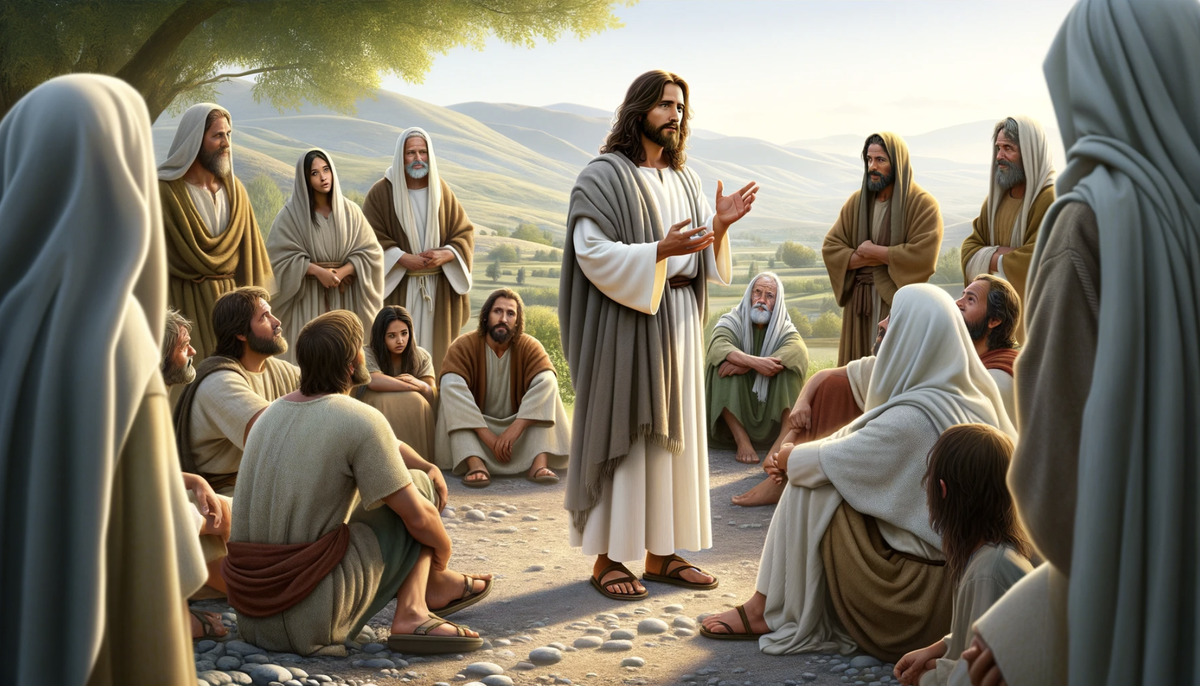
2. When Did Jesus Clearly Self-Declare Himself the Messiah and Divine?
Jesus didn’t make his identity a secret or open to interpretation. He clearly claimed to be the Messiah and divine.
John’s gospel records the clearest declarations of Jesus. Christ openly identified himself as the Messiah in his conversation with the Samaritan woman at the well (John 4). She said, “I know that Messiah is coming (he who is called Christ). When he comes, he will tell us all things.” To which Jesus responded, “I who speak to you am he.” Here is the first moment recorded where Jesus directly states his Messianic identity to a person.
Jesus also makes another powerful claim in John 8:58, which many people might miss. He tells the Jewish leaders, “Truly, truly, I say to you, before Abraham was, I am.” It might seem strange to us how the Jews immediately tried to stone him. But Jesus referred to the name God has given himself to Moses: I AM (Yahweh) in Exodus 3:14. The crowd clearly understood how he claimed to be God, a human being who says he existed even before the father of the faith, Abraham.
Even more so, Jesus said, “I and the Father are one,” in John 10:30. Once again, the Jews picked up stones to kill him and gave the reason, “Because you, being a man, make yourself God.” (John 10:33) Jesus didn’t correct them or their statements. He was a being fully God and fully human. Instead, he goes on to defend his statement.
Mark’s gospel also records a public declaration before the Jews the night before Jesus’ death. When brought before the Jewish council, the high priest asked him, “Are you the Christ, the Son of the Blessed?” Jesus answered clearly, “I am, and you will see the Son of Man seated at the right hand of Power, and coming with the clouds of heaven.” Jesus declared himself the godly, divine being from Daniel 7:13 and Psalm 110, which we mentioned above. The high priest tore his robes and accused Jesus of blasphemy, due to Christ’s divine claim.
Photo Credit: Image Created by AI
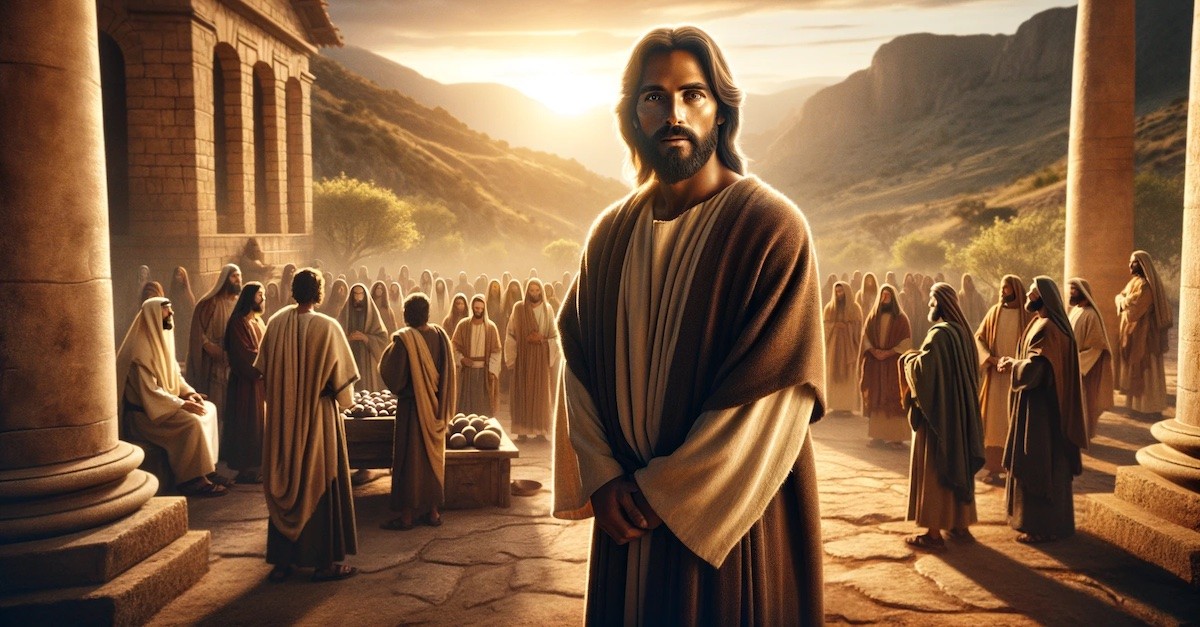
3. When Did Jesus Indirectly Declare Himself God?
Jesus also revealed his divinity through actions and teachings, referencing Old Testament ideas and history.
In John 6:35, Jesus said, “I am the bread of life,” which referenced God giving manna to Israel in the wilderness, a supernatural provision of bread from the sky or heaven (Exodus 16). The manna provided physical sustenance. However, Jesus claimed God sent him for something more important: eternal life.
Jesus declared himself the “Good Shepherd” in John 10:11. This has several Old Testament connections, many of them to God. Psalm 23 famously states, “The Lord is my shepherd.” As the Son of David, Jesus uses the king’s words to identify himself as God. Further, Ezekiel 34 condemns the false shepherds (leaders, rulers) of Israel, and then God promises to personally show up and be the good shepherd. Jesus reveals himself as the fulfillment of Ezekiel’s divine Good Shepherd.
Jesus also forgave sins, something only God could do. In Mark 2:5-7, he said to the paralyzed man, “Your sins are forgiven.” The scribes got upset and asked, “Who can forgive sins but God alone?” Jesus doesn’t argue with this. Instead, he healed the man to prove he had divine authority there, too, both over creation and to forgive sins.
In Matthew 12:6, Jesus shares with the crowd, “I tell you, something greater than the temple is here.” God supposedly dwelt in the temple, the center of worship. Yet in those days, that symbol of God’s presence, the Ark of the Covenant, was missing. In claiming to be greater than the temple, he implies himself as the new meeting place between God and man, rooted in one of his names, Immanuel, God with us (Isaiah 7:14).
Photo Credit: Created by AI
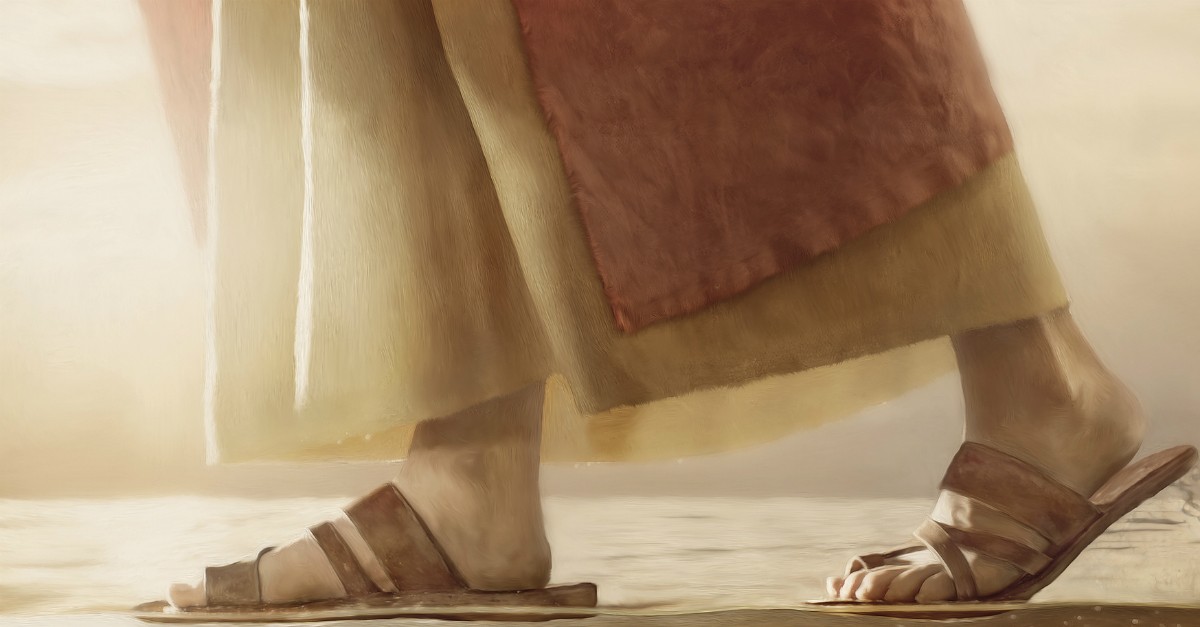
4. What Gospel Narratives Reveal Jesus as God?
The gospel writers also connected many of Jesus’ miracles and actions with things only God could do. They go beyond the supernatural only, proving Jesus as divine.
Mark 4:35-41 records how Jesus calmed the raging sea with the words, “Peace! Be still!” The wind and waves obeyed him. The disciples experienced terror, asking, “Who then is this, that even the wind and the sea obey him?” Only God can command the sea, as Psalm 107:29 said, “He made the storm be still, and the waves of the sea were hushed.”
Jesus walked on water in Matthew 14:22-33. The sea and the ocean symbolized chaos and death in the Old Testament (God parting the Red Sea for Israel, etc.). In Matthew, the disciples saw him walking on the water and cried out in fear. “Take heart: it is I. Do not be afraid,” Jesus told them. The Greek phrase used there for “it is I” is the same “I AM” from Exodus 3:14 (ego eimi). After Peter briefly walked on water with Jesus and they made it back to the boat, the disciples said, “Truly you are the Son of God.” The experience revealed Jesus as God.
In John 11, Jesus raised Lazarus from the dead after four days in the tomb. Before doing so, he tells Martha, “I am the resurrection and the life. Whoever believes in me … shall never die.” Jesus didn’t perform a miracle, separate from himself. He is resurrection and life; therefore, with his words, he can bring life to the dead, a role only God can do.
While the gospels have many such stories, the ultimate proof Jesus is God comes when he rose from the dead (Luke 24, John 20). Every other biblical resurrection happens divinely through a person on earth, from the prophets to Jesus. But Jesus rose alone, an independent work of God, proving his divinity and victory over death and sin.
Photo Credit: ©GettyImages/KristiLinton
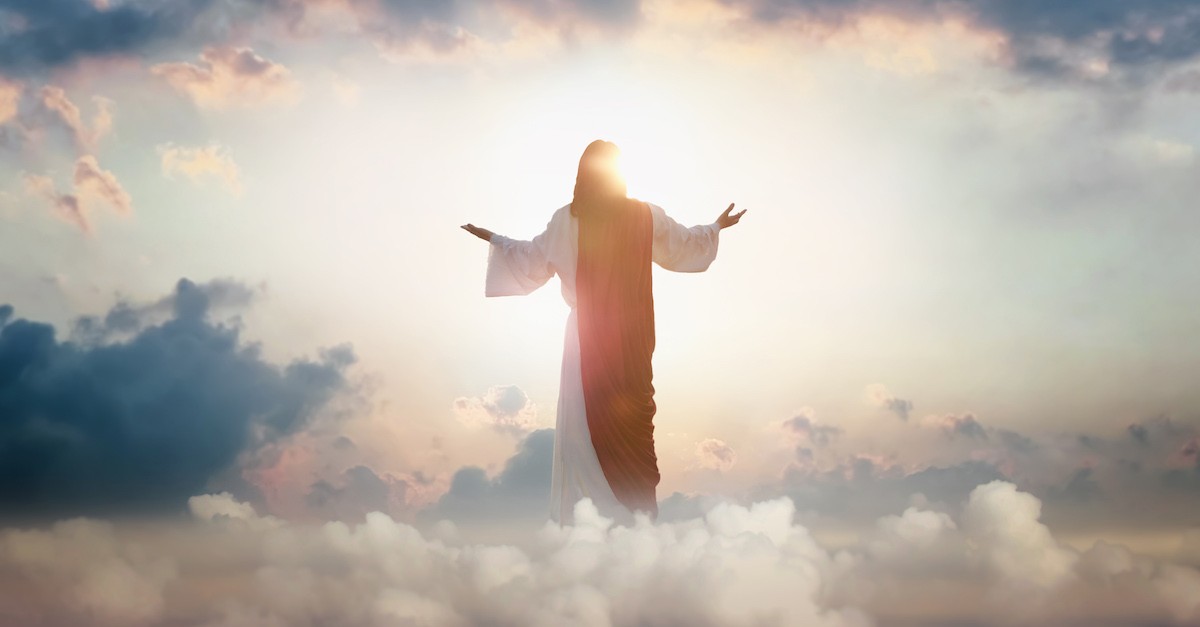
5. What Do the Inspired Apostolic Letters Say About the Divinity of Christ?
The apostles wrote or influenced the gospels, so it shouldn’t surprise us that they continually affirm the divinity of Jesus in their letters. John 1 begins with a clear statement. “In the beginning was the Word, and the Word was with God, and the Word was God.” The apostle declares Jesus as the eternal Word existing before creation and as the Creator God. This Word becomes human to live with us, pointing to Jesus (John 1:14). Thomas, one of the twelve main disciples, encountered Jesus after the resurrection and said, “My Lord and my God!” (John 20:28). Jesus didn’t rebuke or correct him.
The writer of Hebrews makes radical claims about Jesus’ nature. “He is the radiance of the glory of God and the exact imprint of his nature, and he upholds the universe by the word of his power.” (Hebrews 1:3) The author communicates this to the Jews, that Jesus was fully God, fully revealed the nature of God, and continues to act as God by holding the cosmos together with his word, connecting to John 1’s statements about Jesus.
As the apostle to the Gentiles, Paul clearly proclaims Jesus as “the image of the invisible God, the firstborn of all creation.” He affirms John’s statements: “by him all things were created … all things were created through him and for him.” Paul writes how Jesus isn’t a created being but the Creator, sustaining all things.
Further, in Titus 2:13, Paul writes to a fellow minister, encouraging disciples to wait “for our blessed hope, the appearing of the glory of our great God and Savior Jesus Christ.” The apostle Peter (who witnessed walking on water and heard God’s words) also refers to “our God and Savior Jesus Christ,” using the same divine title (2 Peter 1:1).
These verses aren’t exhaustive. When the Old Testament speaks of the Messiah, the writers and prophets declared him as divine. From the gospels to Acts to the letters to Revelation, the entire New Testament declares Jesus as fully man and God. As John tells us, any message denying his humanity or divinity comes as a lie, from an evil spirit (1 John 1:1-2, 1 John 4:2). Let us hold fast to this reality, central to truth and the Gospel which saves to the uttermost.
Photo Credit: Image Created by AI

Originally published Wednesday, 30 July 2025.
